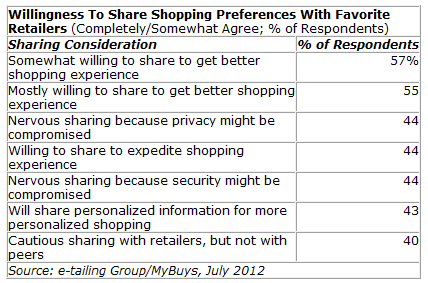 Consumers are said to rely more on the advice of their peers and even social connections than on businesses themselves. However, this doesn’t mean they trust the social networks themselves when it comes down to sharing their data.
Consumers are said to rely more on the advice of their peers and even social connections than on businesses themselves. However, this doesn’t mean they trust the social networks themselves when it comes down to sharing their data.
Recently, the e-tailing group and MyBuys released some findings from a survey stating that the surveyed consumers feel more comfortable sharing data with retailers than with social networks.
They do so even more when sharing data improves their shopping experience. I bet the same goes for other experiences as well. Most social networks suck at dealing with consumer data and don’t take into account what their users want in that regard. They dictate on how they will use these data, and it does take some time to find where to change settings or stay up-to-date with latest changes.
It’s weird that many social networks are often so bad at marketing and don’t listen at what their users want. Facebook, for instance, once sent me a mail (yes, 1), to ask what I would like to see improved. However, it wasn’t because I’m using Facebook, it’s because I have been planning and running campaigns on it. It’s clear where the priorities are in “improving”.
Well, here’s the thing: if it’s all about putting walled gardens up in which consumers are supposed to live their digital lives, the large social networks will be confronted with more fast-growing newcomers and lose users. Then there will be little to improve for the advertisers since it’s all about data consumers are very confused about today. And tomorrow? No idea.
Pamper your owned media and precious visitors
The findings, regardless of the precise data, strengthen me further in my conviction that it’s stupid – in most cases – to spend so much in driving traffic to social networks as many do.
Social is where sharing, conversing and community happen, to name just a few. However, for those nice and juicy links, you use the platforms to drive traffic to your owned media. It’s not for the traffic as such but for capturing the attention of people who are interested and interesting, nurture them and provide them value. If that needs data, fine: it’s simply a quid pro quo.
I find it good news that consumers are more willing to share data in exchange for something that makes their interactions with businesses more relevant and personalized as the table below shows (source: MediaPost).

If businesses – not just retailers – don’t mess up, are clear on how they use data and deliver on their data promises, they have nothing to fear.
The social networks on the other hand, have. Which makes me wonder, by the way, why European businesses need to add all kinds of cookie warning and acceptance tools while the social networks apparently don’t?
Since here is the fact: they pretty much do whatever they want and/or are far from transparent enough. Some of them will pay the price for it.


